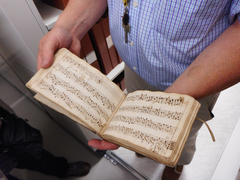Mark the Music! Uncovering Musical Sources in Sweden
Monday, July 24, 2017

Last month, the week before the IAML Congress in Riga, the Svenska musikbiblioteksföreningen (the Swedish branch of IAML) hosted a course called Mark the Music — a course for librarians working with music. Pia Shekhter (University of Gothenburg’s Music and Drama Library) invited me (Jennifer Ward) to give a presentation about RISM.
Since I had never spent a lot of time in Sweden before, Pia generously invited me and another speaker, Carolyn Dow, to spend some time before the course exploring the Swedish countryside. One highlight was a visit to the historic town of Skara, home to one of the oldest cathedrals in Sweden. Pia wanted to show us the famous Stifts- och landsbiblioteket (S-SK), which houses a significant collection of music materials (with over 1,000 records in the RISM online catalog). We got there just before the library closed for lunch. Pia explained that we were music librarians and that I work for RISM. I showed the librarian my business card and his face immediately lit up and he pointed to the blue RISM volumes behind him on the shelves. We were then treated to a tour of the library, including its digitization center and a special peek at the vault where the rare materials are kept. The librarian went straight to the music materials and showed us highlights from the printed music and manuscripts collection (see image). RISM opens doors! The tour ended with a display of the famous Skara Missal, a twelfth-century illuminated manuscript that contains chant notation and is one of the oldest books in Sweden.
After all this history, we went on to the conference. From 15-16 June 2017, around 40 music librarians from Denmark, Finland, Norway, and Sweden gathered together at the University of Gothenburg to listen to presentations on various topics that affect music libraries today. There was also ample time to discuss and share resources with one another.
I held a workshop that introduced participants to Muscat, RISM’s specialized program for cataloging musical sources. In total, sixteen people were in attendance.
Workshop participants learning about Muscat
I also had the opportunity to give a presentation about several ways, big and small, that librarians can contribute to RISM. Two of the most important things for me to emphasize were how RISM documents music manuscripts from all time periods and that Muscat is freely available for any librarian to use. The course was an excellent opportunity to meet our Scandinavian colleagues and make new connections. A few librarians expressed direct interest in working with RISM and Muscat so I hope that RISM activities in the Nordic countries will intensify.
Other speakers included:
- Bonna Boettcher (Cornell University), who gave talks on streaming music licenses, critical editions, and off-the-beaten-track music research databases
- Carolyn Dow (Lincoln City Libraries), who gave examples of current trends and innovations in public libraries (lending ukuleles or playing a banana piano, anyone?)
- Ann Kunish (Oslo Public Library), who gave a talk about services in music libraries
- Barbara Dobbs Mackenzie (RILM), who shared new resources from RILM and gave an overview of IAML
- Judy Tsou (University of Washington), who shared her experience contributing to national registries for sound preservation in the United States
- Tine Vind (Danish Agency for Culture), who talked about public libraries in Denmark
Slides are available online.
The course included a study visit to the Herbert Blomstedt Collection, which is housed at the university and open for researchers. It includes the conductor’s personal book collection plus an impressive collection of rare manuscripts that Blomstedt has collected over the course of his many travels. Since Blomstedt is still an active conductor, his personal scores are still in his possession. The curator of the collection told us of how Blomstedt still actively seeks out rare materials and buys them knowing that he will be able to entrust them to the care of the university library.
Many thanks go to Pia Shekhter for the kind invitation to speak in Gothenburg and for the excellent organization of the course. Tusen tack!
Share Tweet EmailCatégorie: Evénements

